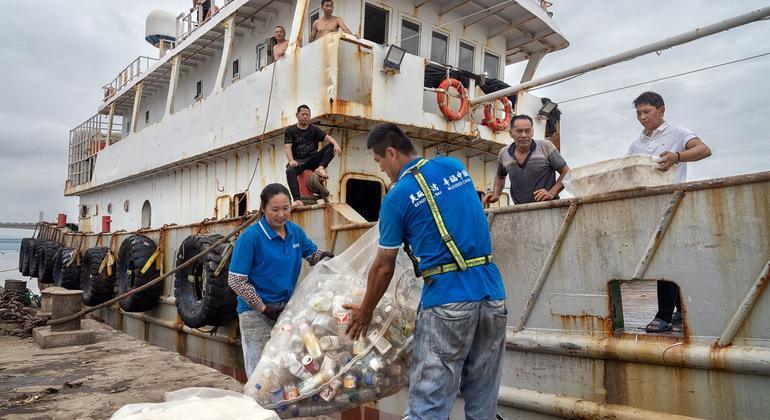“”The world wants and indeed needs a conventional plastic treaty because the crisis becomes uncontrollable – and people are frankly indignant“Said Inger Andersen, Executive Director of the UNEP of the United Nations Environment Program (UNP), the United Nations Agency at the head of talks.
“We know that plastic is in our nature, in our oceans, and yes, Even in our body… What is certain is that no one wants to live with plastic pollution. »»
Uncontrollable
Unless an international agreement is inked, production and plastic waste should triple by 2060, causing significant damage – including our health – according to the UNEP.
Katrin Schneberger, head of the Swiss environment, echoes a legally binding treaty, insisting that plastic waste “stifle our lakes, harming wildlife and threatening human health. It is more than a simple environmental problem, it is a global challenge that requires urgent and collective action. “”
Addressing journalists on the sidelines of the negotiations of the treaty, Ms. Schneeberger stressed that there was “no call to a production ceiling” by the producing countries.
Compromise spirit?
“”Reaching a shared understanding that measures are necessary both on production and consumption can help unlock negotiations“She said as director of the Swiss Federal Office for the Environment.
Supporters of an agreement compared it to the Paris climate agreement in terms of meaning. They also underlined the pressure which claims to be exerted against an agreement by Petrostats, whose crude oil and natural gas provide the constituent elements of the plastics.
“We will not recycle the crisis of plastic pollution: We need a systemic transformation to reach the transition to a circular economy“, Inger Andersen, executive director of the UNEP, insisted in the previous comments on the need for global regulations on plastics.
Virtuous circle
With 10 days of talks planned for the UN Treaty in Geneva, supporters of an agreement hope that the agreement will cover the complete life cycle of plastics, from design to production and elimination.
The treaty should “promote plastic circularity and prevent plastic leaks in the environment”, according to the text which now guides the negotiations carried out by the Intergovernmental negotiation committee (inc).
At 22 pages, the Document Inc contains 32 projects that will be discussed online. The text is designed to shape the future instrument and serves as a starting point for negotiations by countries in Geneva.
“A few [countries] will face the reduction, others will have to face mechanical recycling and others will treat alternatives, “said Andersen.” Let’s see how we can get there thanks to negotiations. I think there is a lot of good faith in the working group at the moment. “”
The talks led by UNEP followed a decision in 2022 by the member states to meet and develop a legally binding international instrument to put an end to the crisis of plastic pollution, including in the marine environment in the two years.
The scale of the problem is massive, with straws, cups and agitators, transporter bags and cosmetics containing single -use microbead microbeads found in our oceans and discharge sites.
In comments to journalists, Ms. Andersen recalled having turned Pakistan after deadly floods killed more than 1,000 people in 2022 and since debris and plastic were “a large part of the problem and that is why we are here, to find a solution while leaving no one behind and while ensuring that the economic wheels are constantly turning”.
Deactivation effect
The activists gathering on the sidelines of negotiations expressed their hopes for a treaty as ambitious as possible.
They included Shelan Saling, from California, who is the interim president of the Netwer Plastic Action Network (YPAN). “Plastic affects everything, from climate change, from health to fertility, including congenital malformations; It affects physical disorders, as well as invisible disabilities, ”she said PK Press Club Monday.
Any treated in Geneva must be robust enough to meet the needs of all countries of the world whose approach differs concerning the design, production, waste and recycling of plastic. He will also have to resist the time test, said Andersen.




